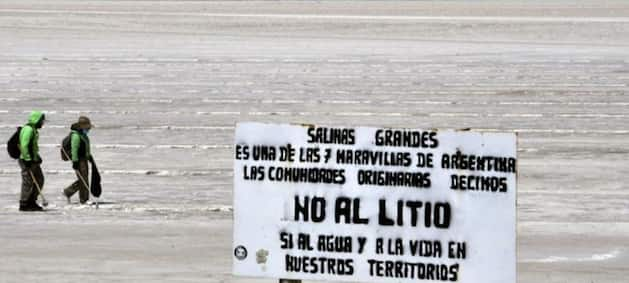Around 57 percent of the world’s lithium deposits are located in the country triangle of Argentina, Bolivia and Chile. The raw material is in great demand because it is used to produce batteries for electric cars. The Chinese are big on business, having invested billions worldwide in a strategic pool position. The USA is also in a better position than the Europeans.
The car nation Germany, on the other hand, is lagging behind. It is therefore necessary to do some follow-up work when Chancellor Olaf Scholz travels to Argentina, Chile and Brazil from the weekend.
“In comparison to China, but also to other countries, Germany is not yet very present in the lithium triangle of South America. At least there are approaches to change that,” says Carl Moses, an economics expert and consultant from Buenos Aires, in an interview with DW.
In Chile and Argentina, German companies are in a good starting position, but the really big breakthrough has not yet happened.
“In this strategically important issue, I lack a regulatory or at least coordinating hand that can only come from the state. We need German consortia in which important players work together at all levels of the value chain,” Moses suggests a coordinated effort by German industry and politics.
China’s lead in Bolivia is most evident. A German-Bolivian joint venture should actually lead to effective cooperation there. But home-made mistakes, political unrest in Bolivia, distrust from the local population and a preference for China on the part of the government led by socialist President Luis Arce, which was more critical of Europe, ensured that the project died a quiet death and that Germany in Bolivia had to take a back seat.
A few days ago, on the other hand, the Chinese consortium CBC succeeded in concluding a contract in the Andean nation. An investment of one billion US dollars, at least according to the announcement, should now lead to the construction of two lithium carbonate plants, announced the responsible Bolivian minister Franklin Molina a few days ago. According to the reports, this is the first international participation in the project in the country with the largest lithium deposits in the world.
Two German companies have a foot in the door in Argentina and Chile. The comparatively young company Deutsche E-Metalle (DEM) is one of them and plans to “become one of the world’s leading specialists in the fields of e-materials and e-mobility, which are part of the current super-cycle of electric mobility”. on the company’s website.
This should be made possible, among other things, by indirect access to a large portfolio of licenses (over 70,000 hectares) located in the lithium triangle in Argentina.
Here, too, China is a big player: The Chinese company Ganfeng recently acquired the Argentine company Lithea, which owns the licenses for two lithium salt lakes, for 962 million US dollars. Tibet Summit Resources – also from China – wants to invest two billion euros in lithium exploration projects in Argentina.
The situation in Chile is a bit more difficult than in Argentina. Here it is unclear which regulatory framework a new constitution will grant to foreign companies, which is still to be politically negotiated. A company from Thuringia (Liverde) signed a cooperation agreement with Chilean partners in the Salar de Maricunga in October 2022 and is in the starting blocks.
China is also very active in Chile. Beijing recently secured a 24 percent stake in Chilean company SQM, currently one of the world’s largest lithium producers. There are also other licenses for other Chinese companies.
A breakthrough could be achieved in the medium term, especially in Chile, because the sustainable thinking of the Chilean government is entirely in line with the German approach. From those close to Chilean President Gabriel Boric, it can be heard that his government, which would like to retain the greatest possible state control over lithium production and its value chain, is open to German cooperation.
Author: Tobias Kaufer (Rio de Janeiro)
The deadline for filing property tax returns is coming to an end. Many real estate owners are frustrated because they don’t know exactly how much they will have to deduct from 2025. A key factor here is the municipal tax rate. And now it seems to be going up.
Two people were killed and seven injured in a knife attack on a regional train from Kiel to Hamburg on Wednesday. A man attacked travelers with a knife before arriving at Brokstedt station. The suspect is known to the police and has been arrested. All news in the ticker.
The original of this post “Germany needs a catch-up race” comes from Deutsche Welle.








